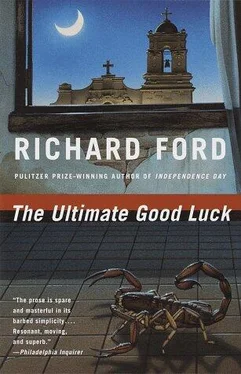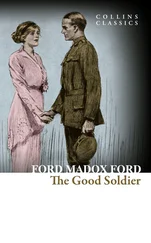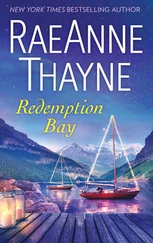Rae smiled appealingly and snapped her head to sweep her long hair off her shoulders. “He doesn’t know enough,” she said, and sighed. “The guy who knows everything is the guy who runs the rabbit. He’s in control of fate. You don’t know him, do you?”
He figured enough time had gone by now. “I dont want to pry, but you haven’t been to Mississippi, have you?” he said.
She didn’t look at him. “Yeah, it’s a shit hole,” she said.
One of the wheelchair women was straining toward the TV monitors with a stack of green show tickets under her watchband, and her jaw swinging, unable to be still. It wanted to smile when there wasn’t anything to smile about. He was nervous the woman had Rae in hock for her clothes.
“Well, since you liked it so much, how about let’s go again?” he said in a hurry.
Rae frowned at the woman in the electric wheelchair. “There’s a lot of geeks around here, aren’t there?” she said.
Quinn had on new fawn whipcords and an eighty-dollar handmade silk shirt from Charnet Street in Bangkok, and he guessed she had him down for a loser trying to get fucked free. But that was going to be her worry.
“You think I’m turned out, don’t you?” Rae said, looking up at the monitor again.
“Of course not,” he said. The wheelchair woman was buzzing toward them. She had a wrist watch on each arm, and they made him feel like his own time was getting short.
“I’m really a scientist doing research on assholes,” Rae said and shook her hair out. “I thought this was the best place to find them, what do you think?”
“What about Mississippi?” he said and smiled at her. “I don’t have all day.”
Rae looked at him in a weary way that made her face burnt out. She knew he’d already figured something out and she was just trying to decide what difference it made if he was right and how seriously she was going to have to take him. She looked up at the monitor, where the track was empty and motionlessly pink, then back up the long line of payoff windows with green and yellow blinking lights signaling the high rollers with good tickets. “We’ll just talk, right?” she said cruelly, and let her win tickets flutter away. “I can have my luggage sent on later.”

They spent the next six days in a roomette in Mississippi City, facing Route 90 and the Gulf. Rae had two ounces of Mexican hash, and Quinn had the best part of nine hundred dollars, and they stayed out on the shell beach every day until dark, then drove in to Biloxi to the bars. Late at night in the room they’d get loaded and drink beer and dance to Chicago radio until early in the morning when Quinn could get to sleep without pills.
Rae said she was a landscape painter from New York. She had spent six years after Brooklyn Academy living in Taos with a boy from New Rochelle who made adobe houses and sold hashish to skiers. She said she was thinking about opening a shop when he got busted and sent to Santa Fe, and she had come down to Tesuque to wait, and got a job caseworking on the Nambe pueblo and teaching grammar-school kids to paint mountain sunsets. She said casework was a lot like being in jail, except hotter, and she hated it, and after a year she got tired of being by herself and moved into Santa Fe with a bureau lawyer who was a Rosebud Sioux from Yale interested in politics and not too smart, but who had a big house and a Mercedes and wanted to marry a white woman. She said she got along with the lawyer until he decided he wanted her to have his baby, and hassled her so that she ended up having to treat him like any other fucked up Indian on her case list with obsessions about never dying, and she began drinking and taking too much mescaline and finally quit visiting the boy in prison, and thought about moving back to Long Island. But one morning she just left with a guy she’d met at a charity rodeo, another Indian, a better one, she said, a Ute named Frank Oliver from Lewiston, Washington, who was an ex-convict, a saddle bronc rider, and a car thief, who laughed all the time and had plenty of money and didn’t care about being immortal if he didn’t have to die right away.
Frank Oliver drove a big blue and silver Southwind that he’d stolen, with a painting of Mount Rainier on both sides and a two-stall horse trailer (a get-up she said they used to laugh about every day), and he pulled the trailer around the country to stock shows and rodeos, wherever he could ride broncs and strip cars for parts. The Southwind had a big stereo and red velour swivel chairs and indirect light, and she said the whole thing surprised her about herself, but she had discovered Cabet and spent one straight four-month period inside the RV, painting landscapes out the window, reading and getting stoned in the mornings with Frank, and riding through towns trying to draw a good mental picture of whatever she’d been doing for seven years and not been able to stay exactly current with. She said she just suddenly got frantic in Santa Fe and had to cut loose from everything responsible, so that it didn’t matter if she lived in a trailer or a house or who she lived with, as long as there wasn’t any trouble and there was some sense of pleasing variety. She said sometimes Frank would come in drunk at night and so banged up from horse falls he couldn’t even laugh, and she’d have to get straight to drive the next day while he laid up and slept long enough to make entry wherever the next town was and get himself connected with whoever was stealing cars. And she said on those days, when Frank was asleep and she was driving, she figured out that what she was doing was simple craziness and nobody in his right mind would be doing it, but it was all she could bear to think about longer than a minute.
Rae said her brother was in Los Angeles playing Industrial leagues basketball and her father was a landscape painter in Bay Shore, and that she didn’t have any plans. She said she could have stayed with Frank or not stayed with him, and that while it wasn’t necessarily any good, it wasn’t necessarily bad either. Until Frank broke his reins hand in a calf rope in Houston and had to lay off riding. She told Frank she would go to work painting street portraits if he’d buy her an easel and some brushes, and instead he had driven them to New Orleans and gotten in touch with an Italian he knew who was exclusively stealing Alfa Romeos and loading them on boats to Venezuela, and told her she didn’t have to work and put her up in the Monteleone Hotel. Though after the first week he’d gotten busted, and when Rae bailed him out of the Orleans Parish jail she told him something would have to change or she was splitting, and he had taken her to the dog track and stood her under the TV monitor in the middle of the main pavilion and told her that when she got ready to, she could start making money the best way she could, using the Southwind out at the end of the parking lot under the row of palmettos.
She smiled at Quinn in the half-light and stretched her long arm up into the cool shadows. “I was resisting not being young anymore. I was almost thirty. It’s textbook. It’s my penance.” She was just waiting to find the reason not to take him seriously, but she had a sweet unpretending elegance he felt at ease with, and she talked not because she thought it was important, but because they passed the time in an amusing way. “Maybe I’m a bum,” she said. “I just missed being a hippie.”
He could see the little pit fires on Ship Island twinkle in the night like stars. They didn’t remind him of anything, and he was at ease for the first time he could remember. “You can’t call yourself a bum,” he said. “Somebody else has to do that. You don’t get it both ways.”
Читать дальше








![Theresa Cheung - The Dream Dictionary from A to Z [Revised edition] - The Ultimate A–Z to Interpret the Secrets of Your Dreams](/books/692092/theresa-cheung-the-dream-dictionary-from-a-to-z-r-thumb.webp)




